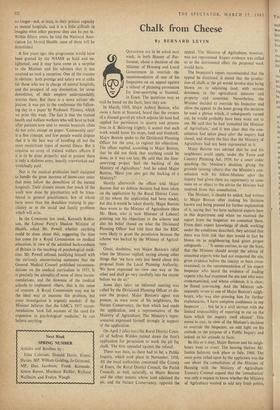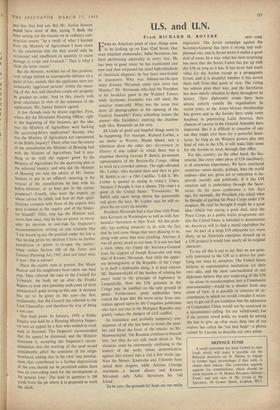Chalk from Cheese
By BERNARD LEVIN QUI I IONS are to be asked next week, in both Houses of Par- liament, about a decision of the Minister of Housing and Local Government to override the recommendation of one of his In March, 1958, Major Aubrey Buxton, who owns a farm at Stansted, heard that the owners of a disused gravel-pit which adjoins his land had applied for permission to quarry and process lime in it. Believing (rightly, it seems) that such work would harm his crops, land and livestock, Major Buxton spoke to the Divisional Planning Officer for the area, to register his objections.
The officer replied, according to Major Buxton, that he did not think that anything could be done, as it was too late. He said that the lime- quarrying project 'had the backing of the Ministry of Agriculture.' And he asked Major Buxton, 'Have you also got the backing of a Ministry?'
Shortly afterwards the officer told Major Buxton that no definite decision had been taken on the application by the Rural District Coun- cil (to whom the application had been made), but that it would be taken shortly. Major Buxton then wrote to the Minister of Agriculture (then Mr. Hare, who is now Minister of Labour) pointing out his objections to the scheme and also his belief (based on what the Divisional Planning Officer had told him) that the RDC were likely to grant the permission because the scheme was backed by the Ministry of Agricul- ture.
Great, doubtless, was Major Buxton's relief when the Minister replied, saying among other things that 'we have only just heard about this proposal from the Local Planning Authority. We have expressed no view one way or the other and shall go very carefully into the matter before we do so' Some days later, an informal meeting was called by the Divisional Planning Officer to dis- cuss the project. Major Buxton's agent was present, as were some of his neighbours, the Nature Conservancy, the firm which had made the application, and a representative of the Ministry of Agriculture. The Ministry's repre- sentative expressed himself strongly in support of the application.
On April 1 (dies irae) the Rural District Coun- cil of Saffron Walden turned down the firm's application for permission to work the pit for chalk. The firm appealed against the refusal.
There was then, as there had to be, a Public Inquiry, which took place in November, 1958.
All the local authorities concerned (the County of Essex, the Rural District Council, the Parish Council), as Well, naturally, as Major Buxton and the other tenants whose land adjoined the pit, and the Nature Conservancy, opposed the appeal. The Ministry of Agriculture, however, was not represented. Expert evidence was called as to the detrimental effect the proposed work would have.
The Inspector's report recommended that the appeal be dismissed. It stated that the produc- tion of chalk at the pit would involve dust being blown on to adjoining land, with serious detriment to the agricultural interests and property and amenities. Nevertheless, the Minister decided to override his Inspector and allow the appeal. In the letter giving this decision he used a phrase which, it subsequently turned out, he would probably have been wiser not to use. He said that he had 'consulted the Minister of Agriculture,' and it was clear that the con- sultation had taken place after the inquiry had closed, and despite the fact that the Ministry of Agriculture had not been represented at.it.
Major Buxton was advised that he and his neighbours could apply, under the Town and Country Planning Act, 1959, for a court order quashing the Minister's decision, giving the grounds (among others) that the Minister's con- sultation with his fellow-Minister after the inquiry had given them no opportunity to com- ment on or object to the advice the Minister had received from this consultation.
The Minister, it should be added, had written to Major Buxton after making his -decision known and being pressed for further explanation of it, saying that 'we have technical experts here in this department and when we received the report from the Inspector we consulted them.
From their expert knowledge of chalk working under the conditions described, they advised that there was little risk that dust would in fact be blown on to neighbouring land given proper safeguards.. . .' It seems curious, to say the least, that the Minister should accept the advice of unnamed experts who had not inspected the site, given evidence before the inquiry or been cross- examined, to the recommendation of his expert Inspector who heard the evidence of leading experts who had examined the site and who were cross-examined, and whose evidence, it is clear, he found convincing. And the Minister sub- sequently wrote to one of Major Buxton's neigh- bours, who was also pressing him for further explanations, 'I have complete confidence in my Inspector . . . but he is a civil servant with the limited responsibility of reporting to me on the facts which the inquiry itself elicited.' This seems to cast, in view of the Minister's decision to override the Inspector, an odd light on his attitude to the purpose of a Public Inquiiry and indeed on his attitude to facts.
Be this as it may, Major Buxton and his neigh- bours went to court. The hearing (before Mr.
Justice Salmon) took place in July, 1960. The main point relied upon by the applicants was the one about the consultation of the Minister of Housing with the Ministry of Agriculture. Treasury Counsel argued that the 'consultation' was only a request to know whether the Ministry of Agriculture wanted to add any fresh points, and that they had not. But Mr. Justice Salmon would have none of this, saying 'I think the letter setting out the reasons on its ordinary con- struction means "As a result of what I learned from the Ministry of Agriculture I have come to the conclusion that the dust would only be occasional and insufficient in quantity to cause damage to crops and livestock." That is what I think the letter meant.'
But the Minister, winkled out of that position, took refuge behind an impregnable defence on a point of law, namely that the applicants were not technically 'aggrieved persons' within the mean- ing of the Act, and therefore could not properly be granted an order. And to this, clearly with great reluctance in view of the substance of the application, Mr. Justice Salmon agreed.
A few threads must be drawn together. First, where did the Divisional Planning Officer, right at the beginning of this business, get the idea that the Ministry of Agriculture were backing the quarrying-firm's application? Second, why was the Ministry of Agriculture not represented at the Public, Inquiry? Third, what was the nature of the consultation the Minister of Housing had With the Minister of Agriculture, had it any- thing to do with the support given by the Ministry of Agriculture for the quarrying plan at the informal inquiry, and why did the Minister of Housing not take the advice of Mr. Justice Salmon to put in an affidavit swearing to his version of the consultations he had with his fellow-Minister, or at least put in the corres- pondence? Fourth, who were the experts on whose advice he relied, and how do their quali- fications compare with those of the experts who gave evidence at the inquiry and of the Inspec- tor himself? Fifth, why has the Minister said, more than once, that he has no power to recon- sider his decision to over-ride his Inspector's recommendation, writing on one occasion that I am bound tg say the position under the law is that having given my decision I have no further jurisdiction or power to re-open the matter,' when—unless Section 100 of the Town and Country Planning Act, 1947, does not mean what it says—this is untrue?
There the matter rests at present. But Major Buxton and his neighbours have taken one final step. They referred the case to the Council for Tribunals, the body set up after the Franks Report to look into precisely such cases of droll administratif gone wrong as this one. A decision has yet to be given in the case—the first, incidentally, that the Council has referred to the Lord Chancellor, and therefore by way of being a test case.
One final point. In January, 1959, a Public Inquiry was held by a Housing Ministry Inspec- tor into an appeal by a firm who wished to work sand at Stansted. The Inspector recommended that the appeal be dismissed, and the Minister dismissed it, accepting the Inspector's recom- mendation that the working of the sand would considerably affect the amenities of the neigh- bourhood, adding that in his view 'any develop- ment that contributed to a further depreciation of the area should not be permitted unless there was an over-riding need for the development at the present time.' The land in question is 300 yards from the pit where it is proposed to work the chalk.







































 Previous page
Previous page